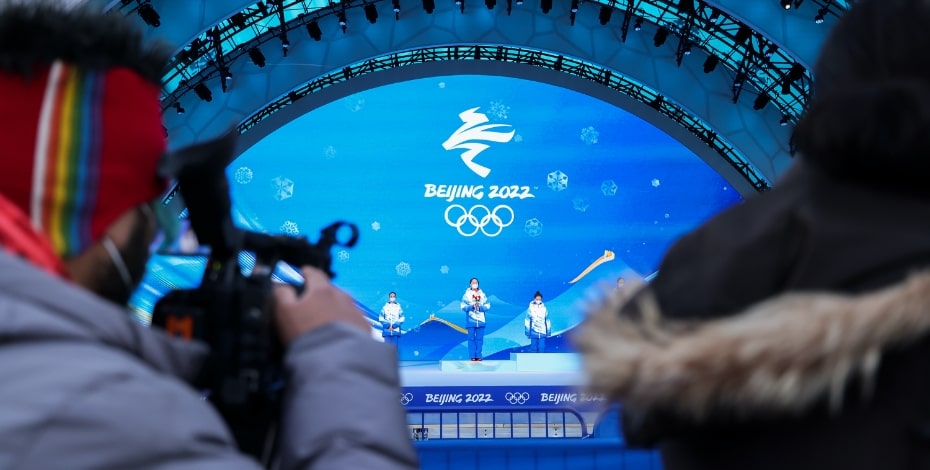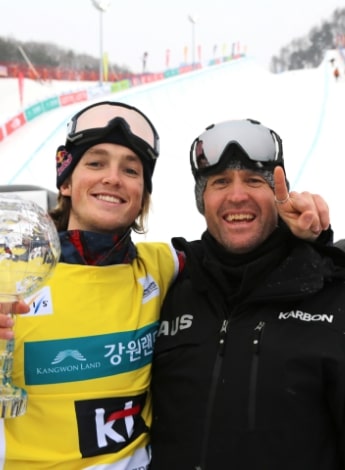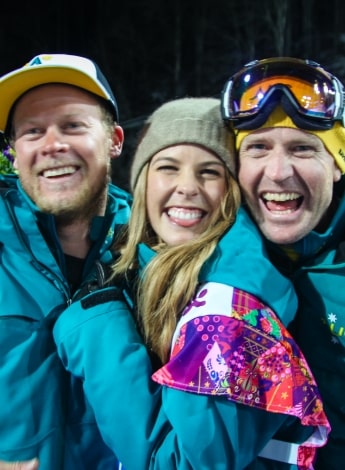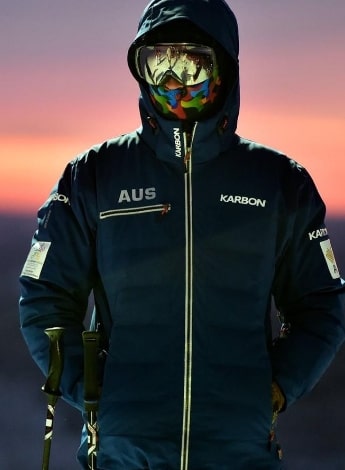
Aussie team has a good run at the Winter Games

At the 2022 Winter Olympics in Beijing, China this month, the health and wellbeing of Australian athletes will be supported by a team of skilled physiotherapists as part of the broader Sports Medicine Network. A conversation with the team’s Medical Services and Rehabilitation Manager, Peter Caine, ahead of the Games scheduled for 4–20 February.
The team of physiotherapists supporting Australia’s Winter Olympic athlete contingent has been in different parts of the world with their athletes for months.
About 40 athletes have either been competing at Olympic qualifying events or ensconced at training camps in northern hemisphere countries such as Germany, Finland, Sweden, France, Austria, Canada, the US and Italy since late last year.
And working feverishly behind the scenes, coordinating the physiotherapy team, both from his home base of Sydney and now in China, is Peter Caine, Specialist Sports and Exercise Physiotherapist (as awarded by the Australian College of Physiotherapists in 2018).
Peter began spearheading the Winter Olympic operations four years ago after working as a physiotherapist at three successive Winter Olympic Games, when he took on the role of Medical Services and Rehabilitation Manager of the Olympic Winter Institute of Australia.
He is a veteran of many World Cup and World Championship campaigns and has extensive experience in sports and orthopaedic rehabilitation.
Peter is director of Altitude Physiotherapy and Massage and a clinical educator for La Trobe University and he has held academic positions within the Faculty of Health Sciences at the Australian Catholic University.

Scott James with Peter Caine at PyeongChang Snowboard Halfpipe World Cup 2017. Photo: Josh Himbury.
Speaking to InMotion, Peter says he is preparing to arrive in Beijing ahead of the Games’s opening ceremony on 4 February.
It will be the first time this physiotherapy team (see end of the article) has been together in one country outside of Australia for some time.
And although the team will be united in China, the physiotherapists will be spread over three athlete villages for the duration of the Games.
This presents not only logistical challenges for Peter as team leader, but also an opportunity to come together and focus on the common goal of the success of the Australian team.
‘It involves a lot of remote management,’ Peter says.
‘However, I think what’s really unique and special about this group is that we put a huge amount of time and effort into developing our service team as a whole.
'For example, when we’re in Australia, we have regular get-togethers where we combine professional development and social activities.
'We also have an annual conference that ensures we form a really tight network.
‘Knowing your team is really integral when you’re on the road as much as ours is.
'Communication sometimes isn’t as easy as it might be face to face.
'Really understanding each other makes those communications much easier, particularly if you’re trying to handle a difficult situation or manage a new acute injury or something that requires additional support and input from back in Australia.’

Peter Caine with Torah Bright and her brother and coach Ben Bright after Torah won her silver medal at the Sochi Olympic Winter Games in 2014. Photo: Olympic Winter Institute of Australia.
Peter describes the Olympic winter environment as a dynamic landscape that can see changes and challenges develop quickly.
Winter Olympic events are high-risk sports, often combining high speeds and heights.
The pressures of training and competition on elite athletes’ physiology demand a certain skill set among those who treat them.
Peter, who describes himself as a ‘winter tragic’, was drawn to working in this field through his two loves—winter sports and physiotherapy.
‘I’m lucky because I’ve been able to combine my passions and call it a job.
'I didn’t grow up in a skiing family.
'I grew up in country Victoria,’ Peter says.
‘I didn’t discover skiing until I was in my early 20s—and I absolutely fell in love.
'I was on a world trip with friends that included a visit to the snowfields in Colorado and I was absolutely hooked.
'By the time I was studying physiotherapy in Sydney, I was looking for ways to get back to the snow.
'Throughout my degree I worked as a tour guide, taking people to the snow.
'I could feed my passion and continue to ski on a student’s budget.’
Peter says the moment he graduated from his physiotherapy degree he hopped on a plane to Canada.
His first call was to an Australian physiotherapist working at Whistler Blackcomb ski resort, Bianca Matheson.
Peter reached out to Bianca, intending to learn how to secure work as a physiotherapist on the slopes, and to his surprise Bianca offered him a job on the spot.
‘That was just before the Winter Olympics in Salt Lake [City], Utah [USA] in 2002.

Peter Caine at the Ruka Moguls World Cup in Finland in 2019. Photo: Chris Hocking.
'Bianca was working with the Australian Winter Olympic team at the time and the Australian team held a pre-Games camp in Whistler,’ Peter says.
‘I got to meet the athletes and other team physiotherapists and I was completely hooked.
'I knew that this was what I wanted to do—I wanted to work in winter sports and with Olympic athletes.’
By 2002, Peter was working as a physiotherapist with the Australian team in the lead-up to Torino, Italy (2006) and then at successive Winter Olympic Games in Vancouver, Canada (2010), Sochi, Russia (2014) and PyeongChang, South Korea (2018).
Ahead of the 2014 Games in Sochi, Peter was asked to take on responsibility for the professional development of the Olympic Winter Institute of Australia’s Sports Medicine Network and this has led to him moving further into management roles.
And while Peter will still very much be a treating physiotherapist at the Games this month in China, he will also help the team focus on the success of the Australian team as a whole.
For those looking to follow in Peter’s footsteps and to work towards becoming a physiotherapist with elite winter athletes, he has this advice: seek work in clinics that are associated with winter sports, build your skills and experience in any way you can and find a mentor who can guide and support you on the next steps to take.
‘Australian sports physiotherapists have a very good reputation around the world.
'Many countries recognise the quality of the Australian education and health systems.
'So there are opportunities for our physios to work in Australia and internationally as well.’
Physiotherapists on the Australian team in China this month are: Eliza Graham, APAM; Scott MacDonald, APA Sports and Exercise Physiotherapist; Ben Bond, APAM; Amber Bennett, APAM; Isabella Kristensen, APAM; Daniel Rogers, APAM; Peter Caine and Benjamin Pagett, APA Sports and Exercise Physiotherapist.
© Copyright 2024 by Australian Physiotherapy Association. All rights reserved.





